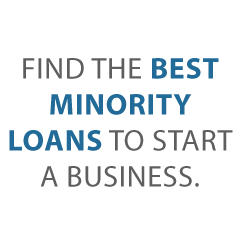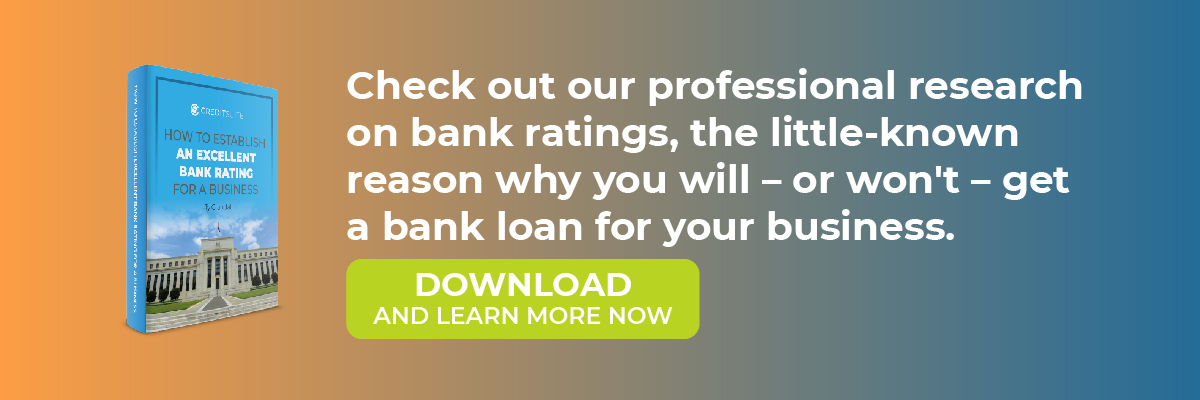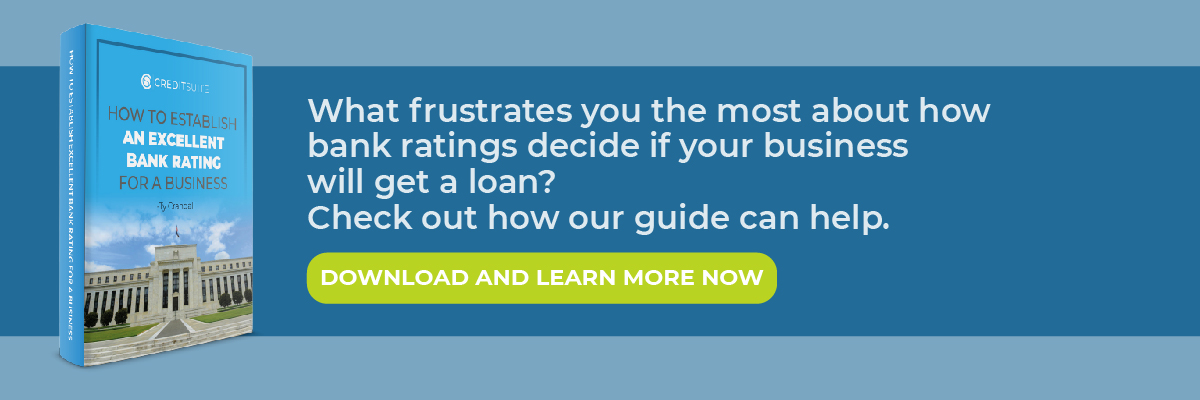If you are reading this, I suspect you are a minority looking to start a business. You either need to know where to start when it comes to finding a business loan, or you have already tried and are having trouble. Maybe you are wondering to yourself “Are there minority loans to start a business?” This is a logical thought, because it would seem it would be easier for minorities to get loans geared specifically toward them.
The truth is, there are some types of loans that are easier than others for minorities to get, but they may not be what you expect. In contrast, some of them probably look exactly like you think they will. Here’s how to find the best minority loans to start a business.
Getting Minority Loans to Start a Business Works Differently than You May Think
In this MBDA study that was recently reprinted, “Disparities in Capital Access between Minority and Non-Minority-Owned Businesses: The Troubling Reality of Capital Limitations Faced by MBEs,” Robert Fairlie, Ph.D. and Alicia Robb, Ph.D. looked at both national and regional studies over several decades. They found that limited financial, human, and social capital, as well as racial discrimination, were the major reasons for the disparities between non-minority and minority businesses.
The study is 10 years old, but many of the realities remain the same.
There are minority specific loan programs out there. Most of them, however, work better for existing businesses rather than for starting a business. Your better option is to simply find loans that, minority specific or not, will work despite the challenges that are unique to minorities when it comes to starting a business.
Also, work to build your business in a way that will make it appear fundable to lenders, regardless of who the owner is.
Minority Loans to Start a Business: What Challenges do Minorities Face When Applying for Business Loans?
According to Forbes, these are major challenges faced by minority business owners in getting business funding.
Lower Net Worth
In general, the level of wealth for Latino and African Americans is 11-16 times less than for Caucasians. White business owners typically have more working capital when they start their business.
Lack of Collateral
For the most part, banks are not as likely to approve loans to applicants with less collateral to use against a loan. Lower net worth means less home ownership and fewer high-value assets to sell if a loan defaults. This combination of less security and net worth means banks will likely issue smaller loans that need to be paid back quickly, slowing long term growth.
Poor Location
Businesses owned by minorities in locations that have not traditionally supported new business are not as likely to get funding.
Little to No Credit History
Credit is a huge factor for banks when considering loan applications. Since minority business owners tend to have lower credit scores, for all the reasons already listed, it is harder to get the best rates and terms.
Are Minority Loans to Start a Business Even Possible to Get?
Absolutely. You just have to know where to look. The first stop is the Small Business Administration. As a general rule, they do not lend money themselves. However, they do offer a federal guarantee on loans made by traditional lenders. This makes it easier for borrowers that may not otherwise qualify to get a loan.
In addition, the SBA offers valuable resources that can help business owners and entrepreneurs prepare for the loan application process as well as running a business.
When it comes to minority loans to start a business, one of the best SBA options is the SBA Community Advantage Loan program.
Minority Loans to Start a Business: SBA Community Advantage Loans
These are designed to meet the needs of small businesses in neglected markets. Of course, that includes minorities. The goal is to get local lenders to increase loans up to $250,000. It does this by backing up to 85% of the loan amount. It helps small business owners who might not be able to get traditional financing.
Consequently, credit decision makers overlook factors such as poor credit or low revenue if the business has the potential to stimulate the economy or create jobs in underserved areas.
Loan amounts range from $50,000 to $250,000 with a maximum interest rate of 11%. Terms range up to 25 years.
Minority Loans to Start a Business: Accion U.S. Network
Accion is a non-profit that offers loans in all states. Funds are available to the following:
- minorities
- veterans
- females
- those with disabilities
- and low to medium income business owners
Loan amounts start from $300 and go up to $250,000. Business owners can use them to help build businesses from the beginning. In addition, Accion will provide you with ways to strengthen your chances of approval should you not qualify.
The qualifications for Accion loans vary by location. You can enter your zip code to see the eligibility requirements for where you live. I entered several different zip codes to get a feel for what I was looking at. Sometimes the minimum credit score was 575. Other times there was no minimum credit score requirement. In addition, there were other requirements that varied by location including not being 30 days late on credit cards, loan payments, or bills. Not being late on rent or mortgage payments over the past year also popped up as a qualifier in some locations.
Minority Loans to Start a Business: Kiva
Kiva is a good place to start to find business startup loans. There is no credit check. It is absolutely free. You have to repay the money, but the interest rate is 0%. The only thing required from you is a thorough business credit profile. Also, you must loan $25 to another business on the site. Last is the requirement that you raise funds from a certain number of friends and family.
Usually, it is at least five people from your own network that need to be willing to pitch in.
Start Building Business Credit and Fundability from the Beginning
Since you are reading about minority loans to start a business, it’s likely your business is in the very early or planning stage. This is the perfect time to set your business up to be fundable, build business credit, and increase your chances for funding approval from all financing sources.
Set Up Properly to Build Business Credit and Overall Fundability
Fundability is the ability of your business to get funding. The first step in building fundability and business credit is to have a fundable foundation. These are the building blocks you need.
Separate Contact Information
The first step in setting up a foundation of fundability is to ensure your business has its own phone number and address. That’s not to say you have to get a separate phone line, or even a separate location. You can still run your business from your home or on your computer.
Actually, you can get a business phone number pretty easily that will work over the internet instead of phone lines. In addition, the phone number will forward to any phone you want it too so you can simply use your personal cell phone or landline if you want. Whenever someone calls your business number it will ring straight to you.
You can use a virtual office for a business address. How do you get a virtual office? What is that? It’s not what you may think. This is a business that offers a physical address for a fee, and sometimes they even offer mail service and live receptionist services. In addition, there are some that offer meeting spaces for those times you may need to meet a client or customer in person.
EIN
The next thing you need to do is get an EIN for your business. This is an identifying number for your business that works in a way similar to how your SSN works for you personally. Some business owners used their SSN for their business. This is what a lot of sole proprietorships and partnerships do. However, it really doesn’t look professional to lenders, and it can cause your personal and business
credit to get all mixed up. When you are looking to increase fundability, you need to apply for and use an EIN. You can get one for free from the IRS.
Incorporate
Incorporating your business as an LLC, S-corp, or corporation is necessary to fundability. It shows your business is legitimate. It also offers some protection from liability.
Which option you choose does not matter as much for fundability as it does for your budget and needs for liability protection. The best thing to do is talk to your attorney or a tax professional. What is going to happen is that you are going to lose the time in business that you have.
When you incorporate, you become a new entity. You basically have to start over. You’ll also lose any positive payment history you may have accumulated as well.
This is why you have to incorporate as soon as possible. Not only is it necessary for fundability and for building business credit, but so is time in business. The longer you have been in business the more fundable you appear to be. That starts on the date of incorporation, regardless of when you actually started doing business.
Dedicated Business Bank Account
You have to open a separate, dedicated business bank account. There are a few reasons for this. First, it will help you keep track of business finances. It will also help you keep them separate from personal finances for tax purposes.
There’s more to it however. There are several types of funding you cannot get without a business bank account. Many lenders and credit cards want to see one with a minimum average balance. In addition, you cannot get a merchant account without a business account at a bank. That means, you cannot take credit card payments. Studies show consumers tend to spend more when they can pay by credit card.
All Necessary Licenses
For a business to be fundable it has to have all of the necessary licenses it needs to run. If it doesn’t, red flags are going to fly up all over the place. Do the research you need to do to ensure you have all of the licenses necessary to legitimately run your business at the federal, state, and local levels.
Professional Business Website
I am sure you are wondering how a business website can affect your ability to get funding. Here’s the thing. These days, you do not exist if you do not have a website. However, having a poorly put together website can be even worse. It is the first impression you make on many, and if it appears to be unprofessional it will not bode well for you with consumers or potential lenders.
Spend the time and money necessary to ensure your website is professionally designed and works well. Pay for hosting too. Don’t use a free hosting service. Along these same lines, your business needs a dedicated business email address. Make sure it has the same URL as your Website. Don’t use a free service such as Yahoo or Gmail.
Having these things helps establish your business as a separate entity from yourself as the owner. This is not only important for fundability, but also in building business credit, which is essential to fundability also.
Minority Loans to Start a Business: Don’t Give Up
You may need to use one of the minority loans to start a business listed above to get your feet off the ground. Don’t stop there though. You have to work on building a fundable foundation and building business credit at the same time. This is essential to opening doors to more and better financing opportunities as your business grows.



